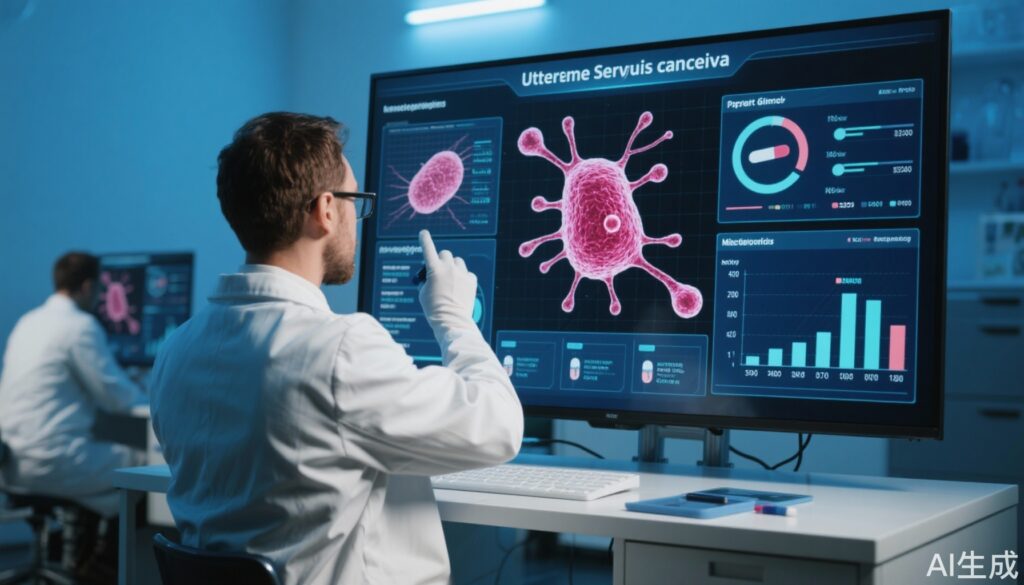Study Background and Disease Burden
Uterine serous carcinoma (USC) represents a highly aggressive subtype of endometrial cancer characterized by poor prognosis and frequent recurrence. Despite platinum-based chemotherapy forming the frontline treatment, patients with recurrent or persistent USC have limited therapeutic options and generally poor outcomes. With the retrospective recognition of genomic aberrations implicating cell cycle dysregulation in USC pathogenesis, targeted agents such as Wee1 kinase inhibitors have emerged as promising investigational therapies. Adavosertib (AZD1775), a selective Wee1 inhibitor, disrupts the G2/M checkpoint enabling preferential killing of p53-deficient cancer cells. Prior studies in other solid tumors suggested adavosertib’s potential in overcoming chemoresistance, warranting evaluation in USC – an unmet medical need prompting the ADAGIO trial.
Study Design
The ADAGIO study was a global, phase IIb, open-label, single-arm, multicenter clinical trial (ClinicalTrials.gov identifier: NCT04590248) designed to evaluate the efficacy and safety of adavosertib in patients aged 18 years or older with histologically confirmed recurrent or persistent USC after at least one platinum-based chemotherapy regimen. Key eligibility included measurable disease per RECIST criteria. Patients received oral adavosertib 300 mg once daily on days 1-5 and 8-12 within a 21-day cycle, continuing treatment until disease progression or unacceptable toxicity. The primary endpoint was the objective response rate (ORR) assessed by blinded independent central review (BICR). Secondary endpoints comprised duration of response (DoR), progression-free survival (PFS), safety profile, and drug tolerability. Exploratory biomarker analyses were conducted on archival tissue samples to identify molecular correlates of response based on prior associations with adavosertib sensitivity in diverse tumors.
Key Findings
Among 104 evaluable patients, adavosertib demonstrated a modest objective response rate of 26.0% (95% confidence interval [CI], 17.9–35.5), including 1 complete response and 26 partial responses. The median duration of response was 4.7 months (95% CI, 3.8–8.3), and median progression-free survival was 2.8 months (95% CI, 2.6–3.9). These outcomes suggest limited but clinically meaningful antitumor activity in this heavily pretreated population with limited alternatives.
Biomarker analyses revealed no definitive predictive molecular alteration linked singularly to response. However, a trend emerged associating CCNE1 amplification or high cyclin E1 protein expression with enhanced responsiveness to adavosertib, implicating cell cycle dysregulation as a potential enrichment marker for Wee1 inhibition. This hypothesis-generating finding warrants prospective validation.
Safety evaluation indicated that most patients (97.2%) experienced treatment-related adverse events (TRAEs), predominantly diarrhea (59.6%), nausea (59.6%), and anemia (58.7%). Grade 3 or higher TRAEs were common, observed in 60.6% of patients, with neutropenia (21.1%) and fatigue (13.8%) as the most frequent severe events. Notably, 17.4% of patients discontinued therapy due to adverse events attributable to the drug in 14.7% of cases, highlighting concerns regarding tolerability at the tested dosing schedule.
Expert Commentary
The ADAGIO study provides important clinical insights into targeting the Wee1 kinase pathway in recurrent USC, a population with unmet therapeutic needs. The observed ORR of 26% signals meaningful antitumor activity considering the heavily pretreated cohort and limited existing treatment options. However, the modest median progression-free survival and short duration of response underscore the need for optimized patient selection and management.
From a translational standpoint, the putative association between CCNE1 amplification/high cyclin E1 expression and response enriches our understanding of biomarkers potentially predictive of Wee1 inhibitor efficacy. Cyclin E1 dysregulation promotes replication stress, theoretically sensitizing cancer cells to G2/M checkpoint abrogation by adavosertib. Notwithstanding, the absence of a definitive biomarker demands further prospective trials with integrated genomic profiling.
The toxicity profile is a significant consideration, with high rates of gastrointestinal and hematologic adverse events at the current dose and schedule. This challenges treatment adherence and underscores the necessity to explore alternative dosing regimens, supportive care measures, or combination strategies to improve tolerability.
In comparison to other targeted agents and immunotherapies trialed in recurrent USC, adavosertib illustrates a novel mechanistic approach but requires refinement to balance efficacy with safety. Moreover, as a single-arm study without a comparator, results should be interpreted with caution, and randomized trials are needed to establish the agent’s definitive role.
Conclusion
The ADAGIO phase IIb trial establishes adavosertib as a promising but challenging therapeutic candidate for recurrent or persistent uterine serous carcinoma following platinum chemotherapy. While exhibiting a 26% response rate, its clinical utility is constrained by substantial side effects at the 300 mg daily dose. Exploratory biomarker data suggesting CCNE1/cyclin E1 expression as a candidate predictor of benefit could guide future precision medicine approaches. Moving forward, research should focus on optimizing dosing, managing toxicity, and validating predictive biomarkers through prospective controlled trials to clarify adavosertib’s role in improving outcomes in this difficult-to-treat malignancy.
References
1. Liu JF, Colombo N, Oza AM, Frenel JS, Corr BR, Rubinstein MM, Nevadunsky NS, Lheureux S, Gaba L, González Cortijo L, Salutari V, You B, Chiang S, O’Connor MJ, Oplustil O’Connor L, Meulendijks D, Khatun M, Ghiorghiu D, Oaknin A. ADAGIO: A Phase IIb, Open-Label, Single-Arm, Multicenter Study Assessing the Efficacy and Safety of Adavosertib (AZD1775) as Treatment for Recurrent or Persistent Uterine Serous Carcinoma. J Clin Oncol. 2025 Sep 10;43(26):2897-2907. doi: 10.1200/JCO-24-01606. Epub 2025 Apr 22. PMID: 40262070.
2. Pearl LH, Schierz AC, Ward SE, Al-Lazikani B, Pearl FMG. Therapeutic opportunities within the cell-cycle machinery. Nat Rev Cancer. 2015 Jan;15(1):3-17.
3. Leijen S, Van Geel RMJM, Pavlick AC, Tibes R, Rosen L, Razak AR, et al. Phase I Study Evaluating WEE1 Inhibitor AZD1775 as Monotherapy and in Combination with Carboplatin in Patients with Advanced Solid Tumors. J Clin Oncol. 2016 Nov 20;34(33):4371-4380.



